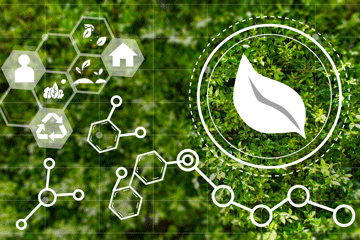
The leading certification schemes for materials in the chemical industry and circular economy
The leading certification schemes for materials in the chemical industry and circular economy
Renewable raw materials such as bioethanol, vegetable oil or biomethane can be used not only for energy but also as materials for manufacturing products. As manufacturers of basic chemicals or as downstream processors (e.g., plastics), they can thus replace conventional raw materials such as natural gas and crude oil (raw material turnaround).
The concept allows flexibility regarding renewable raw materials that replace the equivalent amount of conventional raw materials, e.g., natural gas and crude oil, resulting in a strong demonstration of resource efficiency.
The certification systems ISCC PLUS and REDcert² reflect this concept. Both schemes are similar in terms of the basic principle but differ in detail.

ISCC PLUS is the advancement of the original International Sustainability & Carbon Certification (ISCC EU) scheme. With a focus on the traceability of raw materials within the supply chain, the ISCC Plus standard covers a wide range of applications for recyclable and bio-based materials such as polymers, chemicals, hydrogen, food ingredients, and animal feed, as well as additional technical materials and other areas where biomass is practically used.
It can be applied globally to certify, for instance, the downstream industrial sectors and the chemical industry's sustainable use of biomass and/or recycles from packaging waste.
In addition to the minimum requirements, businesses seeking this certification can select additional modules – so-called voluntary add-ons, such as those for operational materials, environmental management, GHG emissions and restricted substances.
Based on a former TÜV SÜD standard, the REDcert² certification allows companies in the chemical industry to prove the use of renewable raw materials in the production process by a calculation towards a reference substance (e.g. naptha, methane). Suppose the total demand for fossil raw materials per product is known: In that case, it is possible to determine the amount of renewable raw materials required to meet this demand. If a buyer chooses a certified product, an equivalent quantity of renewable raw materials is additionally fed into the processing value chain. The buyer receives a statement about his purchasing behaviour's effect on the change from fossil to renewable raw materials in the value chain. Their final products can therefore be marketed as fossil resource saving, as their end-customers are able to trace how fossil raw materials were replaced in a sufficient volume by sustainable biomass.
The use of renewable raw materials (e.g., bioethanol, biomethane, vegetable oil) ensures the conservation of fossil resources and could lead to the reduction of harmful greenhouse gas emissions.
Parts of the certification criteria such as those relating to the management system, roles, and necessary documentation, are comparable to traditional ISO certifications. Additionally, businesses can either choose to produce segregated or need to develop a so-called mass balance approach for their products. The mass balance indicates the proportion of sustainable raw materials in the end product, considering production losses as well. To ensure end-to-end traceability of the material flows throughout the entire supply chain, documentation and mass balancing are used.
Interested in an ISCC Plus or REDcert² certification? If you would like to know more, please feel free to contact us.
ISCC PLUS and REDcert² certifications verify that your company is saving fossil finite resources and is therefore supporting a sustainable -Bioeconomy and Circular Economy. If a product has received a product-specific certificate, it may be marketed using a certified marketing claim and can achieve higher market values. Due to this certification, businesses in the chemical sector, as well as those who manufacture food and animal feed, are able to show that sustainable biomass or recycled material streams have reduced the use of fossil fuels in their finished goods.
In addition, successful certification in accordance with ISCC PLUS or REDcert² offers the following benefits:
TÜV SÜD's extensive experience in developing standards for renewable energy, climate-neutral and renewable resources in the chemical industry, dates back to 1998. These include green hydrogen and take into account traceability and mass balance approach. In 2013, TÜV SÜD also established the world's first certification scheme for the replacement of fossil based chemical products for non-dedicated production.
As an approved and registered certification body for both ISCC Plus & REDcert² TÜV SÜD accompanies your certification by in-house auditors, i.e., specialists and experts with many years of experience and advanced expertise, which are at the cutting edge of science and technology.
If you would like to know more, please feel free to contact us.
Site Selector
Global
Americas
Asia
Europe
Middle East and Africa